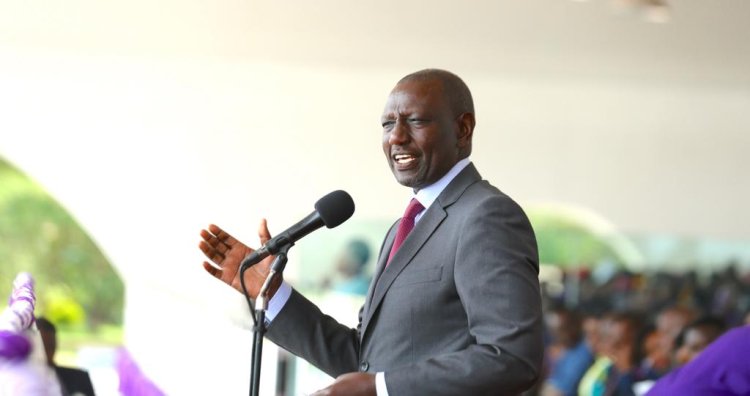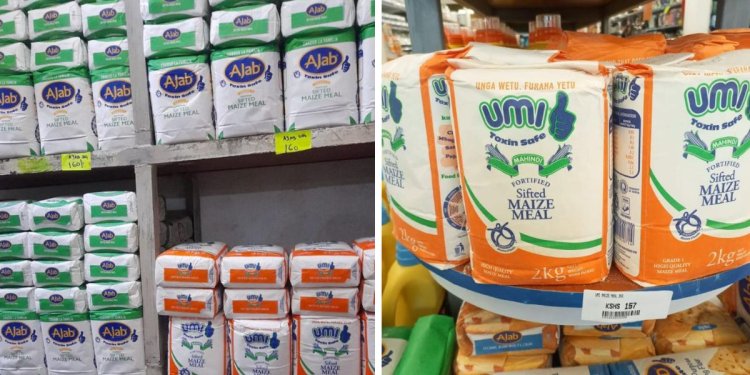Ruto Forced To Explain Ksh158 Unga Sold In Supermarkets
The President was speaking at the Uhuru Gardens in Nairobi during the 58th Labour Day Celebrations.

President William Ruto on Monday, May 1 clarified the availability of cheap maize flour in the Kenyan market after several Kenyans raised questions on not finding the reduced cost of unga as promised, especially in supermarkets.
The President was speaking at the Uhuru Gardens in Nairobi during the 58th Labour Day Celebrations.
He explained that various brands were selling their unga at the cheapest price in the market while others were selling theirs at Ksh200 or more, leaving Kenyans with a right to choose from a wide range of brands, depending on their budget.
"There is maize flour costing 200, other brands go for 180 while the cheapest goes for Ksh158, this gives the consumer an opportunity to choose what suits them," Ruto explained.

Side-by-side image of select Unga brands shared by Government Spokesperson Hussein Mohammed. /TWITTER.HUSSEIN MOHAMED
The President's remarks came after a crowd had shouted at Deputy President Rigathi Gachagua when he mentioned the issue of cheap maize flour, revealing that the government had lowered the cost of maize flour.
"The government has put measures in place to lower the cost of living and even the cost of maize flour has come down to something slightly above Ksh150," Gachagua told the gathering with a section of it opposing him.
A majority of Kenyans had claimed that they were yet to see cheap maize flour across various shops. In addition, leaders allied to the Azimio la Umoja coalition had been criticising the government for misleading Kenyans over the cheap cost of maize flour as most brands had still retained their prices to Ksh200 and above.
At the same time, the Head of State revealed that the cost of unga will not be brought down through street protests, in an attack on the opposition on insisting on demonstrations to lower the cost of living.
"Demonstrations cannot bring down the cost of living, it can not bring down the cost of maize flour," Ruto criticised, adding that it was through facilitating farmers with cheaper farm inputs that can lead to cheaper maize flour.
Ruto also announced reforms targeting the National Health Insurance Fund (NHIF), noting that contributions drawn from his salary to the scheme increased from the current Ksh1,700 to Ksh27,500, meaning salary cuts on his own end.
"It doesn't make sense that the president pays Ksh1,700 every month and the normal mwananchi pays Ksh600 to have NHIF. My salary is Ksh1 million. The boda boda guy earns an average of Ksh5,000. Is it sensible? We have changed the contribution formula hence those paying Ksh500 will pay Ksh300 in the seventh month."
"I as the president who has been paying Ksh1,000 will pay Ksh27,500 and others will also pay a certain amount," he noted.
In addition, the Head of State praised the Hustler Fund initiative and affirmed that small-scale traders would access between Ksh10,000 to Ksh200,000 beginning June 1, 2023.
He also revealed that the government would sign bilateral agreements with at least seven countries to effectively deal with the unemployment crisis in the country. Among the first of the seven countries to benefit from the bilateral agreements is Germany, whose Chancellor Olaf Scholz will be visiting Kenya on Thursday, May 3, 2023.
“There are many countries asking us to give them labour workers and the German Chancellor will be visiting us on Thursday.
"In our meeting, we will sign a bilateral labour agreement so that Kenyans can get an opportunity to job opportunities in Germany. They are looking for 250 million workers yearly and want Kenyans to be part of the workforce,” said Ruto.
Moreover, digital hubs would be created in every ward to tap into the digital economy and essentially drive youth into the digital jobs sector.

President William Ruto with German Chancellor Olaf Scholz. /FILE






